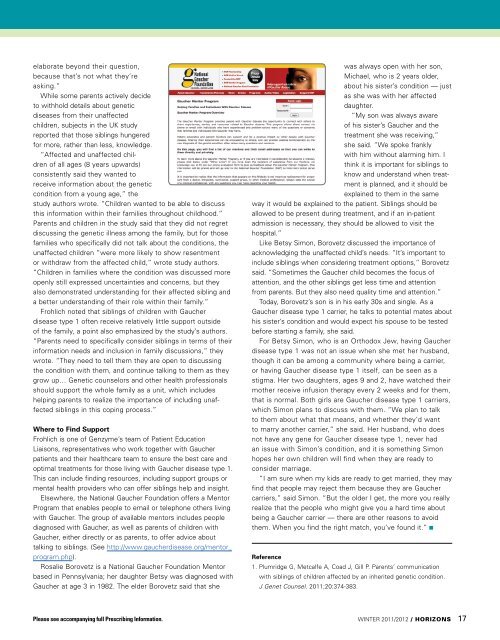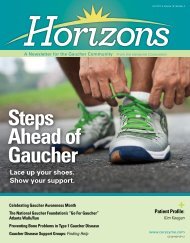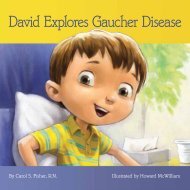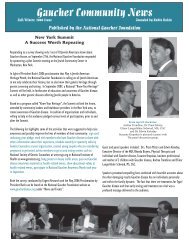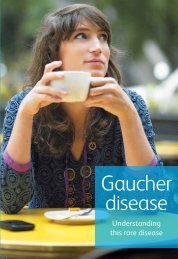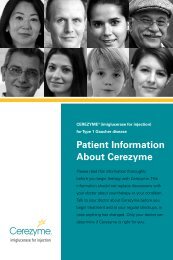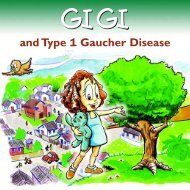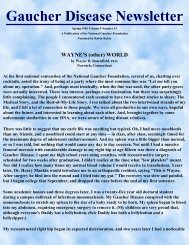Horizons Issue 3 2011 - National Gaucher Foundation
Horizons Issue 3 2011 - National Gaucher Foundation
Horizons Issue 3 2011 - National Gaucher Foundation
You also want an ePaper? Increase the reach of your titles
YUMPU automatically turns print PDFs into web optimized ePapers that Google loves.
elaborate beyond their question,<br />
because that’s not what they’re<br />
asking.”<br />
While some parents actively decide<br />
to withhold details about genetic<br />
diseases from their unaffected<br />
children, subjects in the UK study<br />
reported that those siblings hungered<br />
for more, rather than less, knowledge.<br />
“Affected and unaffected children<br />
of all ages (8 years upwards)<br />
consistently said they wanted to<br />
receive information about the genetic<br />
condition from a young age,” the<br />
study authors wrote. “Children wanted to be able to discuss<br />
this information within their families throughout childhood.”<br />
Parents and children in the study said that they did not regret<br />
discussing the genetic illness among the family, but for those<br />
families who specifically did not talk about the conditions, the<br />
unaffected children “were more likely to show resentment<br />
or withdraw from the affected child,” wrote study authors.<br />
“Children in families where the condition was discussed more<br />
openly still expressed uncertainties and concerns, but they<br />
also demonstrated understanding for their affected sibling and<br />
a better understanding of their role within their family.”<br />
Frohlich noted that siblings of children with <strong>Gaucher</strong><br />
disease type 1 often receive relatively little support outside<br />
of the family, a point also emphasized by the study’s authors.<br />
“Parents need to specifically consider siblings in terms of their<br />
information needs and inclusion in family discussions,” they<br />
wrote. “They need to tell them they are open to discussing<br />
the condition with them, and continue talking to them as they<br />
grow up… Genetic counselors and other health professionals<br />
should support the whole family as a unit, which includes<br />
helping parents to realize the importance of including unaffected<br />
siblings in this coping process.”<br />
Where to Find Support<br />
Frohlich is one of Genzyme’s team of Patient Education<br />
Liaisons, representatives who work together with <strong>Gaucher</strong><br />
patients and their healthcare team to ensure the best care and<br />
optimal treatments for those living with <strong>Gaucher</strong> disease type 1.<br />
This can include finding resources, including support groups or<br />
mental health providers who can offer siblings help and insight.<br />
Elsewhere, the <strong>National</strong> <strong>Gaucher</strong> <strong>Foundation</strong> offers a Mentor<br />
Program that enables people to email or telephone others living<br />
with <strong>Gaucher</strong>. The group of available mentors includes people<br />
diagnosed with <strong>Gaucher</strong>, as well as parents of children with<br />
<strong>Gaucher</strong>, either directly or as parents, to offer advice about<br />
talking to siblings. (See http://www.gaucherdisease.org/mentor_<br />
program.php).<br />
Rosalie Borovetz is a <strong>National</strong> <strong>Gaucher</strong> <strong>Foundation</strong> Mentor<br />
based in Pennsylvania; her daughter Betsy was diagnosed with<br />
<strong>Gaucher</strong> at age 3 in 1982. The elder Borovetz said that she<br />
was always open with her son,<br />
Michael, who is 2 years older,<br />
about his sister’s condition — just<br />
as she was with her affected<br />
daughter.<br />
“My son was always aware<br />
of his sister’s <strong>Gaucher</strong> and the<br />
treatment she was receiving,”<br />
she said. “We spoke frankly<br />
with him without alarming him. I<br />
think it is important for siblings to<br />
know and understand when treatment<br />
is planned, and it should be<br />
explained to them in the same<br />
way it would be explained to the patient. Siblings should be<br />
allowed to be present during treatment, and if an in-patient<br />
admission is necessary, they should be allowed to visit the<br />
hospital.”<br />
Like Betsy Simon, Borovetz discussed the importance of<br />
acknowledging the unaffected child’s needs. “It’s important to<br />
include siblings when considering treatment options,” Borovetz<br />
said. “Sometimes the <strong>Gaucher</strong> child becomes the focus of<br />
attention, and the other siblings get less time and attention<br />
from parents. But they also need quality time and attention.”<br />
Today, Borovetz’s son is in his early 30s and single. As a<br />
<strong>Gaucher</strong> disease type 1 carrier, he talks to potential mates about<br />
his sister’s condition and would expect his spouse to be tested<br />
before starting a family, she said.<br />
For Betsy Simon, who is an Orthodox Jew, having <strong>Gaucher</strong><br />
disease type 1 was not an issue when she met her husband,<br />
though it can be among a community where being a carrier,<br />
or having <strong>Gaucher</strong> disease type 1 itself, can be seen as a<br />
stigma. Her two daughters, ages 9 and 2, have watched their<br />
mother receive infusion therapy every 2 weeks and for them,<br />
that is normal. Both girls are <strong>Gaucher</strong> disease type 1 carriers,<br />
which Simon plans to discuss with them. “We plan to talk<br />
to them about what that means, and whether they’d want<br />
to marry another carrier,” she said. Her husband, who does<br />
not have any gene for <strong>Gaucher</strong> disease type 1, never had<br />
an issue with Simon’s condition, and it is something Simon<br />
hopes her own children will find when they are ready to<br />
consider marriage.<br />
“I am sure when my kids are ready to get married, they may<br />
find that people may reject them because they are <strong>Gaucher</strong><br />
carriers,” said Simon. “But the older I get, the more you really<br />
realize that the people who might give you a hard time about<br />
being a <strong>Gaucher</strong> carrier — there are other reasons to avoid<br />
them. When you find the right match, you’ve found it.”<br />
Reference<br />
1. Plumridge G, Metcalfe A, Coad J, Gill P. Parents’ communication<br />
with siblings of children affected by an inherited genetic condition.<br />
J Genet Counsel. <strong>2011</strong>;20:374-383.<br />
Please see accompanying full Prescribing Information.<br />
Winter <strong>2011</strong>/2012 / <strong>Horizons</strong> 17


